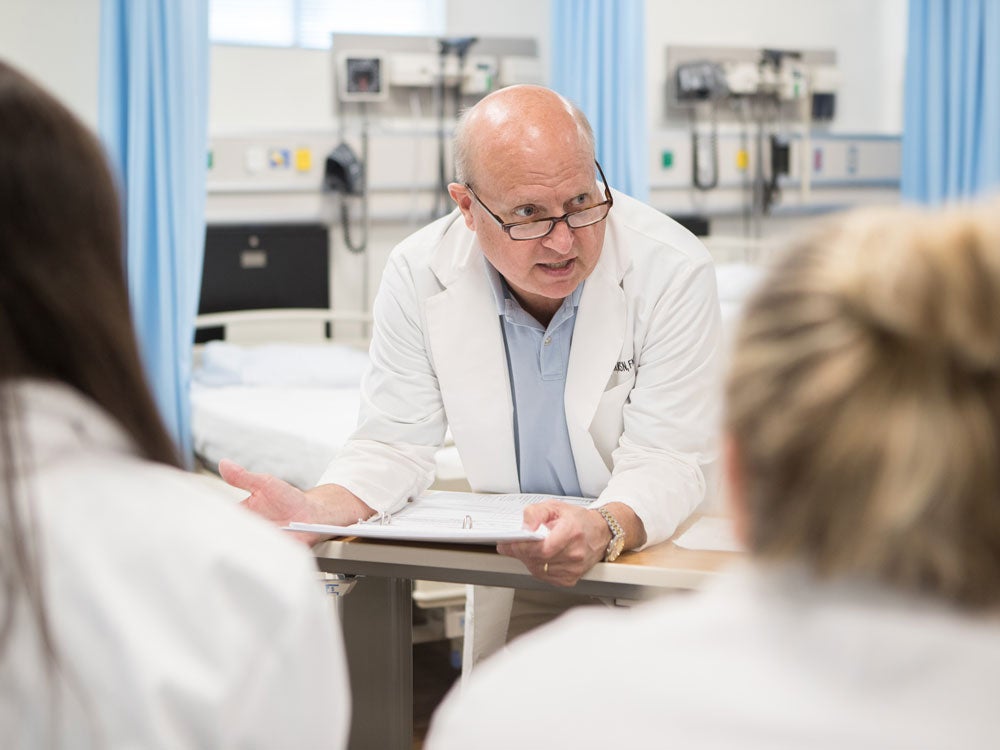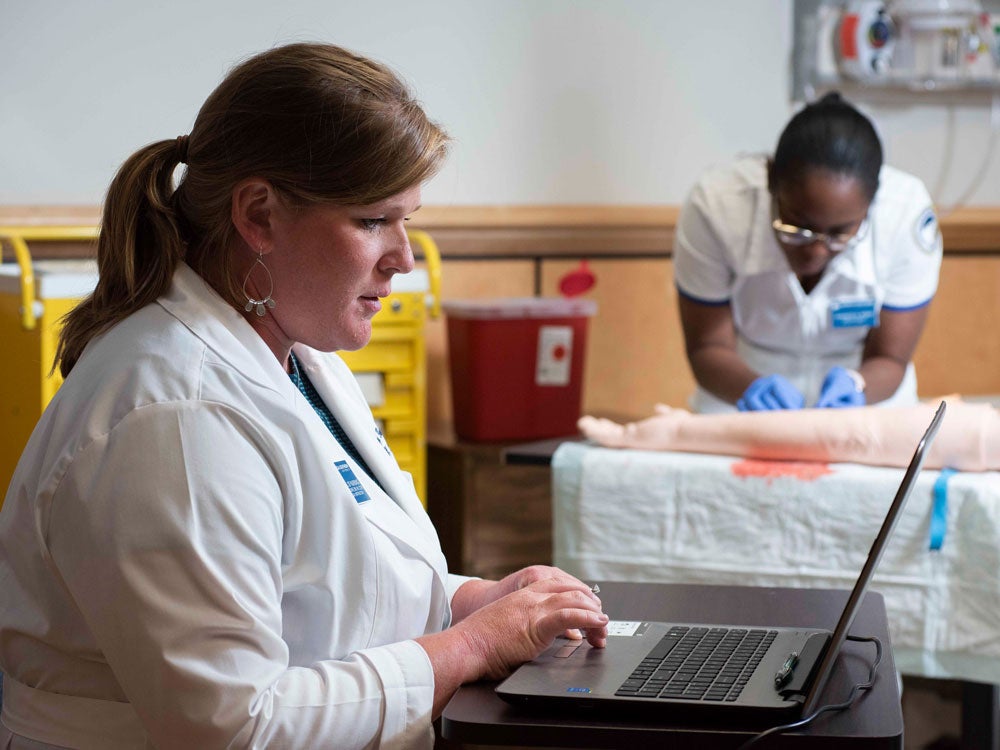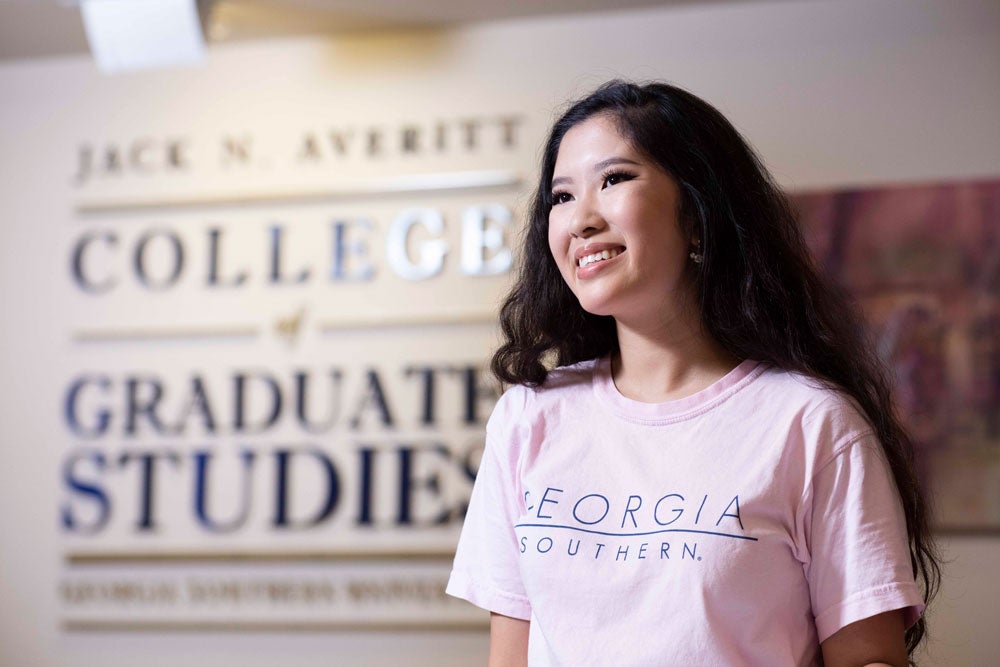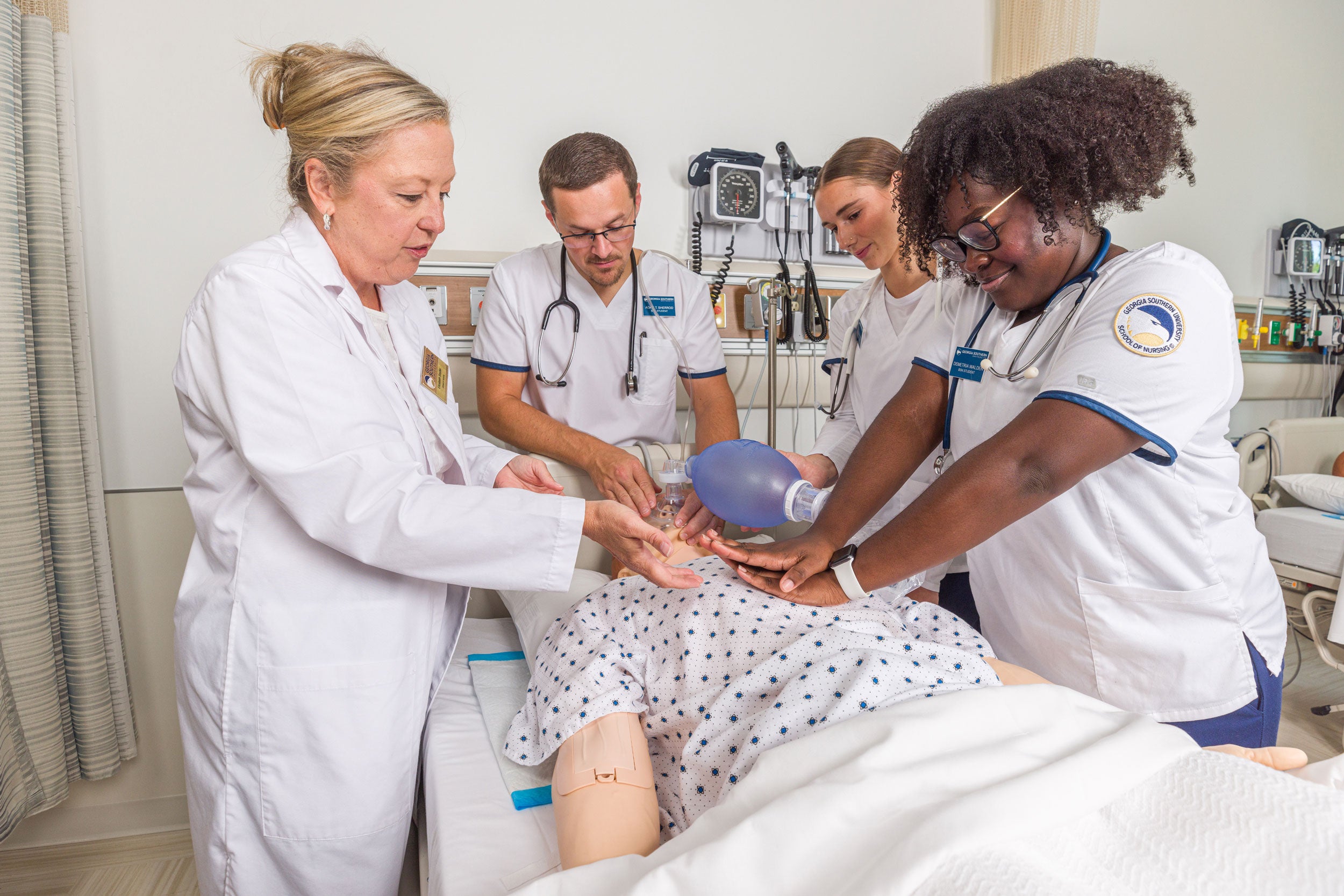Broaden your impact in the health care field. Prepare to equip the next generation of nurses through advanced clinical training and a hands-on exploration of the practice of teaching.
Locations
- Online
Why Earn an MSN in Nursing Education at Georgia Southern?
- Qualify for rewarding roles in preparing other nurses to deliver impactful care.
- Position yourself to respond to an acute need for nurse educators.
- Work while you study with a flexible online curriculum.
- Learn to teach in traditional, hybrid and online formats.
- 36 credit hours to completion.
Georgia Southern University’s Master of Science in Nursing (MSN) in Nursing Education program prepares you to progress from direct patient care to training the next generation of professionals. You’ll study curriculum design and development, teaching methodologies, educational needs assessment, and learner-centered theories and methods, deepening your clinical skills and acquiring a solid grounding in effective teaching techniques. Gaining an advanced understanding of the nursing discipline, you’ll explore pedagogical approaches for teaching in traditional, hybrid and online formats and prepare to work in a variety of settings.
Outside of your fully online classes, you’ll extend your learning through hands-on experience in 360 hours of clinical and instructional practice. When you complete the MSN program, you’ll be ready to teach patients and their families, student nurses, staff nurses and a variety of direct-care providers in both academic and clinical contexts.
Ready to Apply?
What Can You Do With an MSN in Nursing Education?
Your patient care experience, advanced clinical training and preparation as an educator equip you to serve as an expert instructor of patients, their families and nurses. Demand for nurses remains strong overall, but the American Association of Colleges of Nursing reports an acute shortage of nursing instructors. Your MSN positions you to respond to this need and fill rewarding roles in health care and academic settings.
Where our graduates work:
- Community colleges
- Hospitals and health care systems
- Nursing schools
- Technical schools
What our graduates do:
- Clinical nurse educator
- Nursing instructor
- Nursing professional development specialist
- Patient education coordinator
What You’ll Learn
The MSN in Nursing Education program begins with core courses that deepen and strengthen your research and clinical knowledge, including advanced work in pathophysiology, pharmacology and health assessment.
Then, you’ll build your competence as an educator, delving into teaching and learning theories and acquiring a thorough understanding of curriculum design, teaching strategies and methods, and student learning assessments.
You’ll apply and hone your new skills and knowledge through both an in-depth clinical practicum and as you engage in instructional design, teaching and assessment in a course taught by an experienced nurse educator.
See the CurriculumBuild Your Experience
Reinforce and apply what you learn through 360 clinical hours, gaining vital experience and the confidence to step into new roles in your nursing career.

Practicum
Enhance your clinical proficiency and strengthen your patient care delivery skills. You’ll focus on a population of interest or a specific clinical role as you receive input from an experienced health care provider.

Capstone Experience
Serve as a nursing educator in a real-world context. You’ll engage in curriculum development, instructional design and learner assessment in a nursing course under the guidance of a mentor.
Want to Learn More?
Explore essential information about our MSN in Nursing Education program, including application details, accreditation status, and licensing disclosures. Gain insight into the program’s credibility and requirements to help you start your journey toward success with the knowledge you need.
The Master of Science in Nursing program is open to those who have:
- A Bachelor of Science in Nursing (BSN) degree from a college accredited by the appropriate accrediting association (i.e., NLN or CCNE) with a minimum GPA of 3.0 (on a 4.0 scale).
- A current Georgia RN license OR multistate license.
- One year of full-time clinical nursing experience prior to beginning health assessment.
- Completed a course in introductory statistics with a “C” or better.
To apply, please submit:
- An online application. (There is a $50 nonrefundable application fee.)
- Georgia Southern University Health Services Form (must be completed before your first semester and completed each semester afterward).
- Three letters of recommendation. Forms in the online application are acceptable, or you can attach three recommendation letters to the application.
- Proof of American Heart Association or Red Cross Level C (2 person-BLS) CPR certification.
- Proof of Georgia RN licensure. (Write COPY over any replication of any license submitted.)
Submit all materials online with your application through the Office of Graduate Admissions.
Application Deadlines
Students admitted to the program begin in the fall semester.
All admission application materials must be received by March 1 for admission consideration to the fall cohort.
Contact Information:
Chelsea Doyle
Graduate Program Administrative Assistant
Office: Armstrong Campus-Ashmore Hall 266
912-344-2973
chelseadoyle@georgiasouthern.edu
At Georgia Southern, enjoy the flexibility of fully online courses that fit within your busy schedule, allowing you to study while you continue to work and earn. Much of the MSN in Nursing Education coursework is asynchronous (not live), meaning you can complete it at times that work best for you. However, online instructors also weave live, synchronous sessions into your courses, enabling interaction for deeper learning and engagement.
About Our Online ProgramsFor All Online Programs
Federal law requires colleges and universities to make certain disclosures to prospective students of these programs. These disclosures include information on the University’s authority to operate outside of Georgia, complaint processes, adverse actions and refunds.
For required disclosures in general with regard to online programs offered by the University, visit the Office of Legal Affairs website.
The Master of Science in Nursing in Nursing Education degree program at Georgia Southern University is accredited by the Commission on Collegiate Nursing Education.
| Fall Semester 1 6 Credit Hours | Spring Semester 1 10 Credit Hours | Summer Semester 8 Credit Hours |
|---|---|---|
| NURS 7121 Theoretical Basis for Clinical Scholarship (2) | NURS 7142 Advanced Pharmacology (3) | NURS 7137 Curriculum Design and Evaluation in Nursing Education (3) |
| NURS 7110 Scholarly Writing at the Graduate Level (1) | NURS 7143 Advanced Health Assessment (3) | NURS 7135 Informatics (3) |
| NURS 7141 Pathophysiology and Differential Diagnosis (3) | NURS 7710 Advanced Health Assessment Clinical (90 clinical hours) (1) | NURS 9123 Biomedical Ethics (2) |
| NURS 7136 Theoretical Perspectives of Teaching and Learning in Nurse Education (3) |
| Fall Semester 2 6 Credit Hours | Spring Semester 2 6 Credit Hours | |
|---|---|---|
| NURS 7138 Teaching Strategies and Methods in Nursing Education (3) | NURS 7139 Assessment, Measurement and Evaluation in Nursing Education (3) | |
| NURS 7720 Clinical Specialty Practicum (135 clinical hours) (3) | NURS 7721 Nursing Education Capstone (135 clinical hours) (3) |
SLO 1: Integrate core knowledge from the liberal arts, sciences, and nursing as the foundation for advanced level professional practice.
SLO 2: Use knowledge of organizational systems, leadership principles, and resources to become responsible, safe, and accountable advanced level professional nurses that demonstrate professional standards of moral, ethical, and legal conduct.
SLO 3: Demonstrate advanced level clinical judgment/decision making by using healthcare information, technology, scholarship, inquiry, and current evidence to improve individual and population healthcare outcomes.
SLO 4: Collaborate using advanced inter-professional communication to develop partnerships with other members of the healthcare team that improve patient health outcomes.
Many of the clinical programs offered by the Waters College of Health Professions (WCHP) require a clinical internship or practicum experience to fulfill degree requirements. Pursuant to the University’s legal agreements, participants in clinical experiences are required to abide by the workplace rules of the clinical site. The University is aware of recent federal requirements that would mandate vaccination against COVID-19 for those working in certain settings, including health care. At this time, we expect that these new requirements may significantly impact our ability to locate a placement for students who remain unvaccinated. As always, WCHP will continue to make every effort to place students at clinical sites. However, please be aware that we may be unable to locate a site to accept unvaccinated students, which may cause a delay or inability to progress and complete the program of study.

Take the Next Step
Leverage your experience to help train the compassionate caregivers of the future. Get ready with an MSN from Georgia Southern.
Contact Us
Chelsea Doyle
Graduate Program Administrative Assistant
Office: Armstrong Campus-Ashmore Hall 266
Phone: 912-344-2973
Email: chelseadoyle@georgiasouthern.edu



